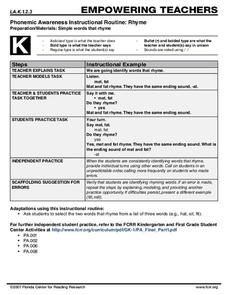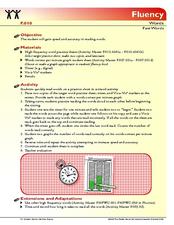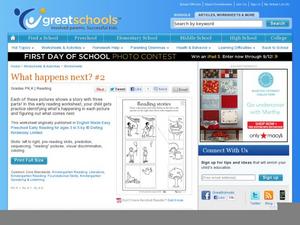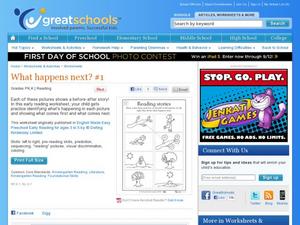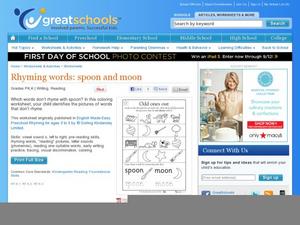Florida Center for Reading Research
Phonemic Awareness Instructional Routine: Rhyme
As a class, kindergarteners identify rhyming words. The teacher provides an example of a rhyming pair and explains why they rhyme. Individual learners then respond by saying a word that rhymes with a given word.
Florida Center for Reading Research
Word Checkers
Young scholars practice reading high-frequency words by playing word checkers. They use the provided checker mat and checkers to read their way to the other side of the mat, making a less stressful way to provide necessary practice.
Florida Center for Reading Research
Final Phoneme Pyramid
Little learners identify final phonemes found in various words. They play a game where they pick a card, say the name of the object on the card, identify the final phoneme, then match it to an image with the same final phoneme. Whoever...
Curated OER
Vowel Sounds: I and O
Early readers put their short vowel know how to the test. They read a series of simple cvc words, circle all the words that contain the medial short vowel sound indicated, then write those words in the space provided. Phonics, reading,...
Curated OER
Vowel Sounds: e
"Eh?" That is the short vowel sound the letter e makes when it is used in the middle of a word. Little ones will draw a line between the letter e and objects that make the short e sound. Then they will fill in the missing e in six...
Curated OER
Vowel Sounds: A
Say aaaaa, because today your class will be practicing the short a vowel sound. They complete two activities. First the draw a line from the letter a to the objects that contain the medial /a/ sound. Then, they fill in the missing a to...
Curated OER
Practicing Letters C and D
The lowercase letter c and d are highlighted in this two-part instructional activity. Kids complete the top half by tracing then printing the letter c and locating images that begin with the /c/ sound. Part two requires them to trace...
Curated OER
Vowel Sounds: O
This worksheet focuses on the medial vowel sound o. Pre-readers complete two tasks to practice the short o sound. They draw a line from the letter o to pictures that contain the medial /o/ sound. They then, fill in six cvc words with the...
Curated OER
Practicing Letters S and T
Let your class learn about the sounds made by the letters s and t. They work to recognize each lowercase letter and match the letter to images that begin with the /t/ or /s/ sounds. They also trace each letter several times.
Curated OER
Practicing Letters W and X
Match initial phonemes to practice recognizing the sounds made by the letters w and x. Early readers circle all of the objects that begin with either an x or a w, then trace each letter several times. Try a fun variation by having...
Curated OER
Play I Spy: In the Bathroom
Usually playing I Spy in the bathroom causes trouble, but not in this instructional activity! Little readers look for objects that begin with the letters b and t. They circle the objects in the picture, count how many of each they found,...
Curated OER
Letters U and V
Little learners familiarize themselves with the letters u and v. They find objects in each of two pictures that begin with either v or u. They say the sound of each letter and then trace it several times.
Florida Center for Reading Research
Fluency: Words, Fast Words
Taking turns, pre-readers time each other as they read high-frequency words.
Curated OER
What's Outside?
Learners determine whether the objects shown are inside or outside. They check the box that is near objects that are located outside of something. They then draw candies outside of a jar.
Curated OER
Odd One Out
Letters q-z are the topic of the worksheet. Learners circle the picture in each row that does not make the initial letter sound indicated. They then fill in the letter that is missing from the beginning or ending of four words.
Curated OER
What's the First Letter? (A to H)
Here are eight words, and each of them is missing a letter. Not just any letter but the first letter. Oh my! Put your phonics masters to work and have them determine which of the eight letters (a-h) completes each word.
Curated OER
What's in Front?
Front and back are common prepositions. Early readers will practice understanding relative positions while using common prepositions by placing a check next to objects in front. Then they draw a cat in front of the house. Tip: Discuss...
Curated OER
Punctuation: Quotation Marks, Question Marks, and Exclamation Marks
There are four children pictured, each is saying a different phrase. It's up to you and your first graders to complete each phrase by adding proper punctuation. Read the dialogue-driven passage, then read what each child is saying,...
Curated OER
What Happens Next: 2
What happens next? That is a great question that requires learners to think about the sequence of events then make a prediction. They assess the pictures on the left and draw lines to the pictures on the right that show what will happen...
Curated OER
What Happens Next? 1
Knowing how to sequence events means you have to know what happens before and after. Little ones draw a line from four before images to the images that show what happened next. This is a good challenge for your youngest learners.
Curated OER
Reading Practice: Winnie-the-Pooh
Whether your first graders can read or not, they will enjoy this comprehension activity. They read or listen to an excerpt from a Winnie-the-Pooh story, they predict what will happen next, then draw Pooh Bear's favorite food. A compare...
Curated OER
Rhyming Words: Spoon and Moon
One of these things is not like the other, one of these things does not belong. It's true! Little learners will say each of the four words in each of four rows, to determine which one does not rhyme with the others. After that, they...
Curated OER
Above, On, Below, part 2
Prepositions describe where something is in space or time. Little learners discover the prepositions about, on, and below. They locate and count objects in each position as they are located in relation to the ground. They then record the...
Curated OER
Lowercase and Uppercase Letters
There are two alphabet-themed tasks on this page. The first requires pre-readers to draw a line to match the upper and lowercase letters. The second requires them to draw a line to match the letters that make the same sound. A well-done...


